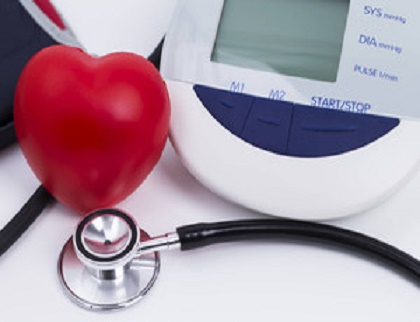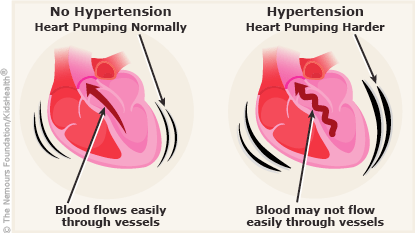
Can children have high blood pressure?
It is usually assumed that High Blood Pressure only affects older people. However, high blood pressure affects people of all ages — from birth to teens as well.
High blood pressure (hypertension) in children is blood pressure that’s the same as or higher than 95 percent of children who are the same sex, age and height as your child.
There isn’t a simple target blood pressure reading that indicates high blood pressure in all ages for children, because what’s considered normal blood pressure changes as children grow.
Why Is High Blood Pressure a Health Problem?
If high blood pressure continues for a long time, the heart and arteries might not work as well as they should. Other organs that are receiving the blood, like the kidneys and brain, also can be harmed.
While high blood pressure doesn’t always cause symptoms, it still affects the body and puts a person at risk for long-term health problems. In rare cases, severe hypertension can cause headaches, visual changes, dizziness, nosebleeds, heart palpitations, and nausea.
If your child has severe high blood pressure and has any of these symptoms, get medical care right away.

What Causes High Blood Pressure?
The causes of high blood pressure in kids can differ, depending on a child’s age. The younger the child, the more likely the high blood pressure is linked to an illness.
In babies, it’s usually caused by prematurity or problems with the kidneys (this is most common), lungs, or heart. These can include conditions like bronchopulmonary dysplasia (an immaturity of the lungs in premature babies) or coarctation of the aorta (a narrowing of part of the major blood vessel that carries blood away from the heart).
While hypertension is far more common in adults, experts link childhood obesity to rising rates of childhood hypertension. In some cases it’s due to a problem with the kidneys or other conditions. If no specific cause is found, doctors call it “essential hypertension.”
How Is High Blood Pressure Diagnosed?
All kids should have their blood pressure checked regularly. Doctors usually start measuring blood pressure during routine checkups when kids are 3 years old. So it’s important not to miss these appointments, particularly if your child is overweight or there’s a family history of high blood pressure.
Diagnosing hypertension in kids can be tricky because it doesn’t always cause noticeable symptoms. In kids, high blood pressure is defined as blood pressure greater than the 95th percentile for their age, height, and gender
Blood pressure varies a lot from day to day. So, several blood pressure checks might be done to make a diagnosis. (unless the pressure is very high, and then treatment is needed right away).
It’s not unusual for a first blood pressure reading to be high if a child is nervous. The health care provider will likely take three readings, then use an average of the three to determine whether a child has (or is at risk for) high blood pressure.
Some doctors use a test called ambulatory blood pressure monitoring; a child wears a blood pressure cuff all day to confirm a hypertension diagnosis. It’s often more accurate than blood pressure tests in the doctor’s office because the child is less likely to be affected by any stress from the office visit.
Prevention of High Blood Pressure in children
High blood pressure caused by another condition can sometimes be controlled, or even prevented, by effectively managing the underlying condition.
High blood pressure can be prevented in children by making the same lifestyle changes that can help treat it; controlling your child’s weight, providing a healthy diet and encouraging your child to exercise.
[What nutrients are children commonly missing]
How Is High Blood Pressure Treated?
If an illness is causing hypertension, treating it might be enough to get the blood pressure back to normal.
Many kids and teens with high blood pressure have an unhealthy lifestyle; a bad diet, excess weight, stress, and too little physical activity. So the health care provider might recommend weight loss, exercise, reduced screen time (time spent watching TV, or using a computer or mobile devices), dietary changes, and even relaxation techniques. Teens with hypertension should not smoke because it can make the long-term associated heart problems worse.
Here’s what to focus on:
Weight loss: If your child is overweight, your doctor might recommend an ongoing weight-loss program that includes a minimum of 30 minutes of aerobic exercise every day.
Daily exercise: Being fit is a key part of blood pressure control, therefore all children with hypertension should exercise and play sports for 1 hour each day. This could include activity (like jogging) most days and higher levels of activity (like running) 3 times a week. Usually, exercise is restricted only when hypertension is very severe.
Kids with severe hypertension should not do any weight- or power-lifting, bodybuilding, or strength training until their blood pressure is under control and a doctor says it’s OK.
Dietary changes: The health care provider might recommend a diet that includes more vegetables (especially leafy green vegetables), fruits, low-fat dairy products, and fiber-rich foods, and fewer carbohydrates, fats, processed foods, and sugary drinks. He or she also might recommend preparing low-sodium dishes and not adding salt to foods. Watch out for foods with lots of hidden salt (like bread, sandwiches, pizza, and many restaurant and fast-food options).
[How to introduce a Sugar-free lifestyle to your children]
Most health care providers prefer not to prescribe medicine for kids with mild hypertension. However, if lifestyle changes does not bring improvement, then medicines might be needed.
Remember, while mild-to-moderate hypertension is rare in kids, over time it can damage the heart, kidneys, and blood vessels. Diagnosing and treating it will help prevent this damage
Sources: Kidshealth.org
